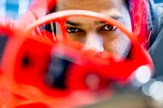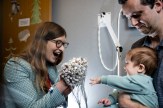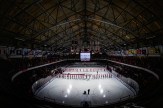STEM labs stoke passions
This summer, a handful of budding science and math scholars and local educators earned a coveted chance to work alongside Northeastern faculty in laboratories focused on chemical, mechanical, and electrical and computer engineering, and pharmaceutical sciences.
Last Thursday, the 24 Boston-area high school students and 21 local teachers who participated in the intensive six-week experience gathered in the university’s Egan Research Center to discuss the highlights of the science and math research that had absorbed them. See two student presentations.
The laboratories are sponsored by Research Experiences for Teachers and the Young Scholars Program. Both efforts—begun in 2001 and 1989, respectively—are overseen by Northeastern’s Center for STEM Education. (“STEM” is shorthand for “science, technology, engineering and mathematics.”)
At Egan last week, the students, teachers, and Northeastern mentors shared their findings in a room overflowing with posters the participants had created to summarize their work. Poster titles ranged from “The Effects of Nanomaterials on Algae Growth,” to “Interactions That Regulate the Cellular Response to DNA Damage,” to “Non-Invasive Brain-Computer Interface Design.”
According to Claire Duggan, the STEM center’s program and operations director, the summer labs reflect a national commitment to sparking interest in math and science. A U.S. government report titled “Rising Above the Gathering Storm: Energizing and Employing America for a Bright Economic Future” actually links the efficacy of math and science education to the continued success of the U.S. economy, she says.
The report specifically mentions the usefulness of summer experiences for teachers and students, Duggan notes.
Revere High School senior Luciana Salles, who worked in assistant chemical-engineering professor Shashi Murthy’s lab, says she was thrilled with her experience.
“I never thought chemical engineering would be so interesting,” she reports. “My goal is to go into biochemistry, and hopefully work on biological-threats research.”
Murthy’s lab also excited chemistry teacher Greg Banks, who hopes to pass his enthusiasm along to his students at Urban Science Academy, in West Roxbury.
“It was really inspiring to work in cutting-edge research,” says Banks. “I have a graduate degree in environmental science, but, in all science fields, changes happen so fast. Working in Sashi Murthy’s lab helped brush me up.”
Banks says he will be incorporating the investigations he did into cell receptors into the courses he teaches.
“We need to teach concepts and disciplines to students in a way that shows them the relevance of their work in the real world,” he says.
Research Experiences for Teachers, funded by the National Science Foundation, links middle and high school mathematics and science teachers and community college STEM faculty to participating labs on the Northeastern campus and elsewhere in Massachusetts. It aims to give teachers an extended research experience, build teacher/professor collaborations, and share best practices.
The highly selective Young Scholars Program offers high school juniors and seniors the chance to work side by side with Northeastern researchers.
Word is out about both programs, says Duggan: “We’ve been overwhelmed with applications.”





